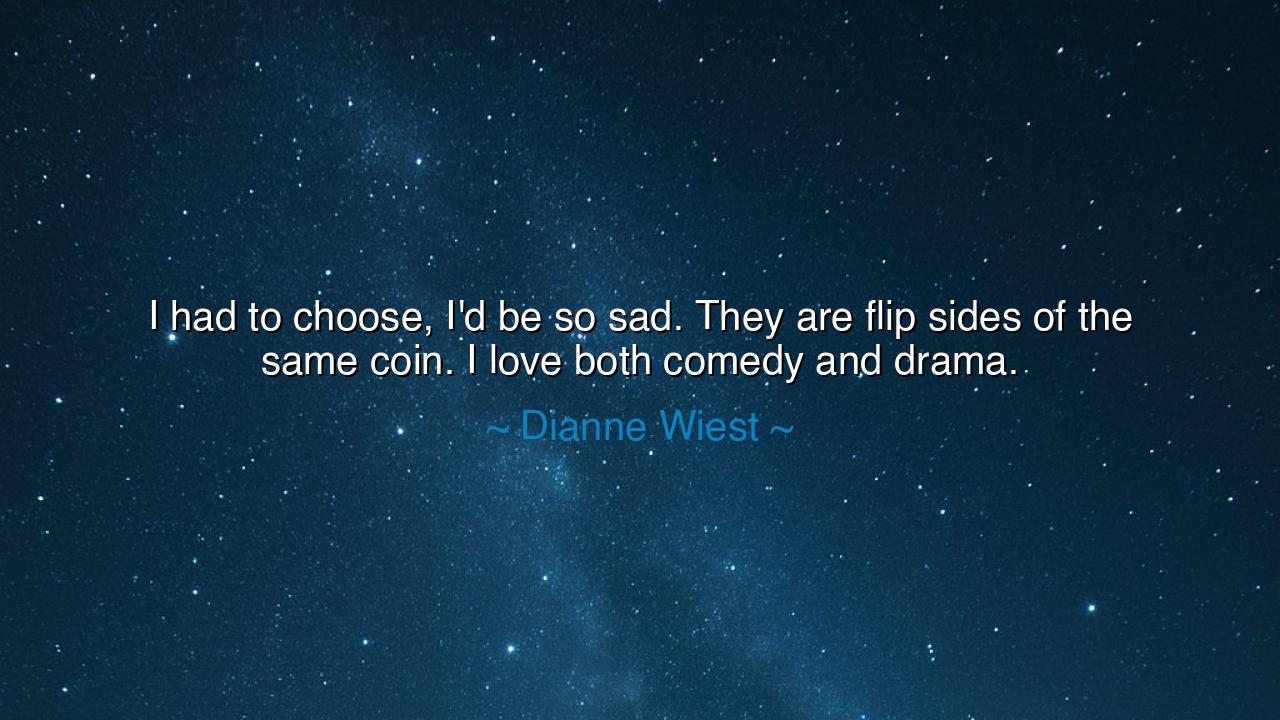
I had to choose, I'd be so sad. They are flip sides of the same
I had to choose, I'd be so sad. They are flip sides of the same coin. I love both comedy and drama.






There are passions in life that cannot be separated, yet each demands its own devotion. Dianne Wiest, reflecting on her love of performance, said, “I had to choose, I'd be so sad. They are flip sides of the same coin. I love both comedy and drama.” In these words lies the profound understanding that joy and sorrow, laughter and grief, are intertwined facets of human expression. For the artist, to embrace both is to honor the full spectrum of life, to recognize that comedy is illuminated by the shadow of drama, and that tragedy is softened by the lightness of humor.
To call comedy and drama the flip sides of the same coin is to acknowledge the duality inherent in human experience. The ancients understood this in their storytelling: Greek tragedies often contained moments of levity, and Roman comedies could carry subtle moral lessons. Life itself oscillates between joy and suffering, and the artist who can navigate both captures truth with greater depth. Wiest’s reflection speaks not merely of preference, but of comprehension: to understand the heart of humanity, one must experience and convey its full emotional palette.
The sadness Wiest anticipates in choosing one over the other reflects a larger truth about limitation and choice in art and life. To forsake either comedy or drama would be to deny a portion of the human experience. This mirrors the wisdom of Aristotle, who in his Poetics described tragedy as catharsis, purging emotion and leaving the soul refined, while comedy exposes folly and vice, enlightening through laughter. Both forms serve a purpose, and to love one without the other is to accept only a partial reflection of life.
Throughout history, great performers have embodied this duality. Consider Charlie Chaplin, whose films evoke both uproarious laughter and profound sorrow. In The Kid, audiences laugh at Chaplin’s antics, yet the story’s heart is steeped in the pain of abandonment and poverty. Chaplin understood, as Wiest does, that comedy and drama are inseparable in their power to illuminate the human condition. The capacity to navigate both realms is the hallmark of mastery.
There is also a personal dimension in Wiest’s reflection: the artist’s heart is drawn to multiplicity, not division. To love comedy is to revel in the joy of life, in surprise and absurdity; to love drama is to explore the depths of human struggle, compassion, and endurance. Both nourish the mind and spirit. By refusing to choose, she honors the complexity of her own sensibilities and the richness of the worlds she seeks to portray.
Her words carry a broader lesson for all seekers of craft and understanding: embrace duality rather than fear it. Life rarely offers the luxury of a single path, and to recognize the value in seemingly opposing forces is to cultivate depth, empathy, and wisdom. The comedian and the tragedian, the joyful and the sorrowful, are united in their capacity to reflect truth. To lean wholly into one while abandoning the other is to experience life only partially.
Moreover, Wiest reminds us that the art of balance is not passive—it is intentional. The artist must practice, observe, and engage with both extremes, allowing each to inform the other. Comedy gains resonance from the shadows of sorrow, and drama finds relief in moments of levity. The tension between them generates insight, making the performance, and the performer, more fully human.
Thus, let Dianne Wiest’s words inspire reflection: do not shy from the contrasts within life or art. Honor the full range of experience, recognizing that laughter and tears, joy and grief, are inseparable in their power to teach, heal, and connect. To embrace both comedy and drama is to embrace the totality of human existence, and in doing so, to approach the highest expression of truth, empathy, and artistic mastery.






AAdministratorAdministrator
Welcome, honored guests. Please leave a comment, we will respond soon